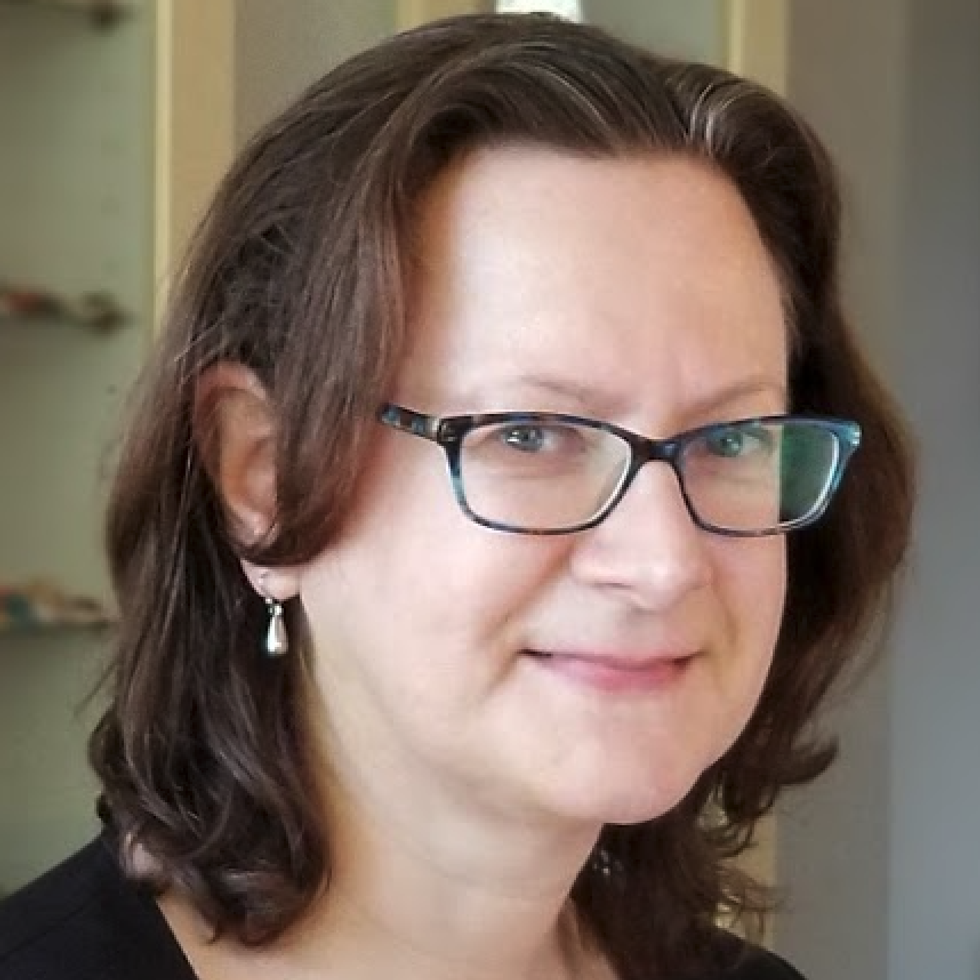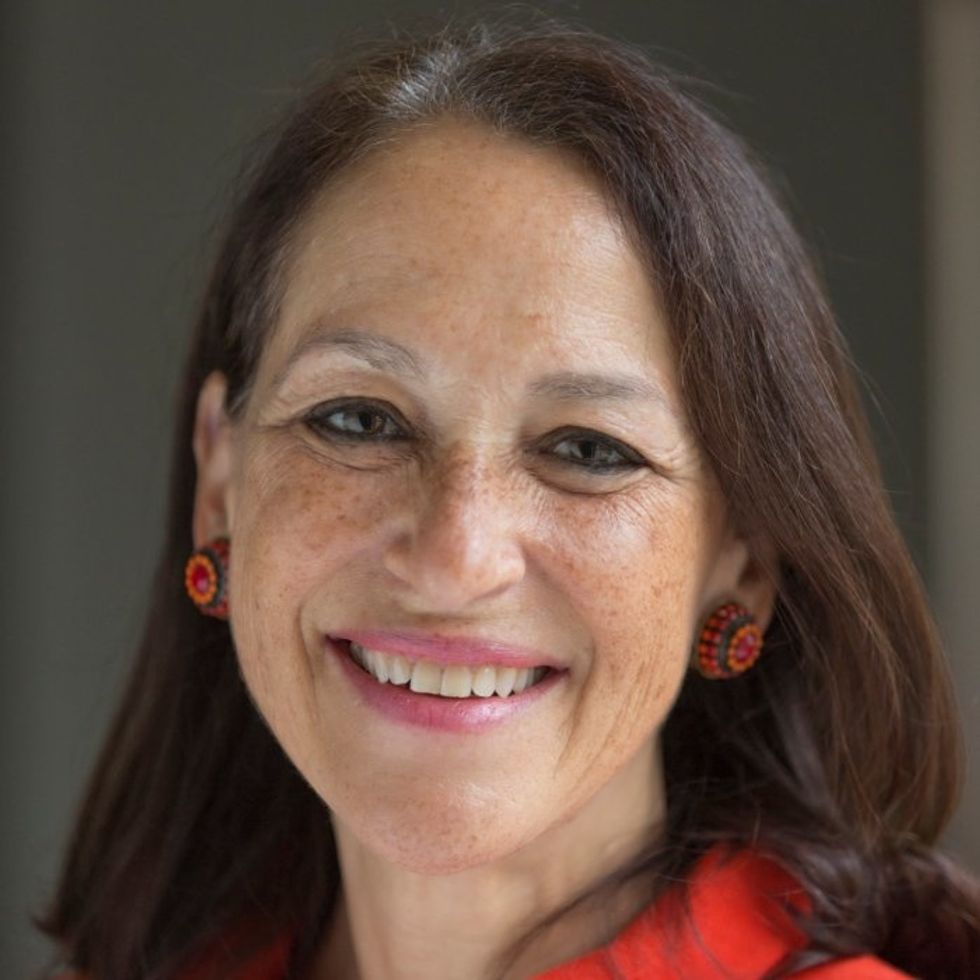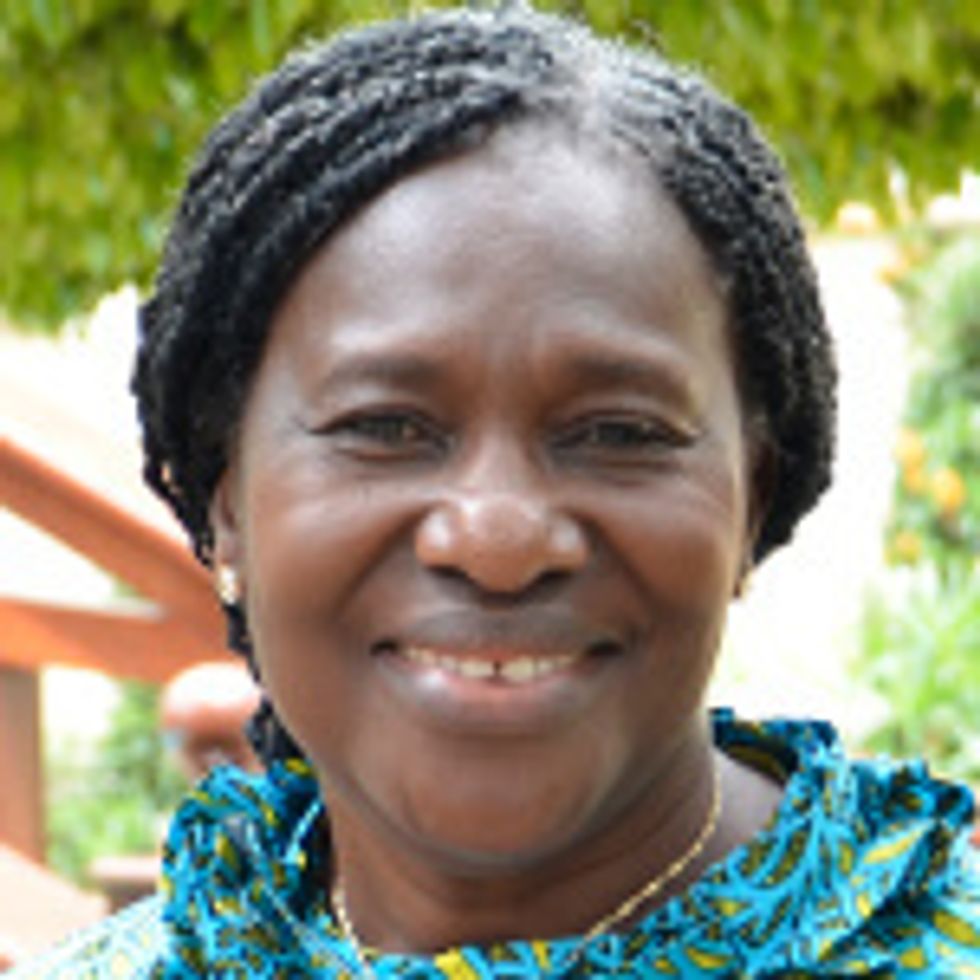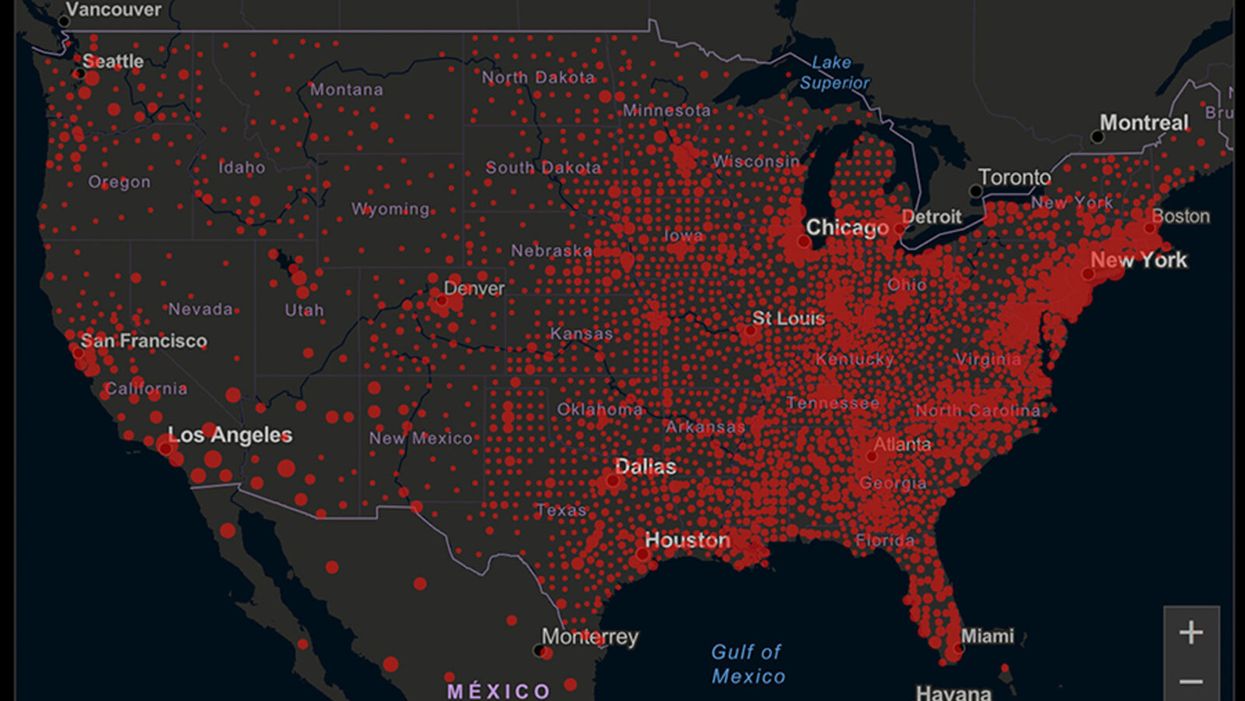Short Story Contest Winner: "The Gerry Program"

A father and son gaze at the ducks in a lake.
It's an odd sensation knowing you're going to die, but it was a feeling Gerry Ferguson had become relatively acquainted with over the past two years. What most perplexed the terminally ill, he observed, was not the concept of death so much as the continuation of all other life.
Gerry's secret project had been in the works for two years now, ever since they found the growth.
Who will mourn me when I'm gone? What trait or idiosyncrasy will people most recall? Will I still be talked of, 100 years from now?
But Gerry didn't worry about these questions. He was comfortable that his legacy would live on, in one form or another. From his cozy flat in the west end of Glasgow, Gerry had managed to put his affairs in order and still find time for small joys.
Feeding the geese in summer at the park just down from his house, reading classics from the teeming bookcase in the living room, talking with his son Michael on Skype. It was Michael who had first suggested reading some of the new works of non-fiction that now littered the large oak desk in Gerry's study.
He was just finishing 'The Master Algorithm' when his shabby grandfather clock chimed six o'clock. Time to call Michael. Crammed into his tiny study, Gerry pulled his computer's webcam close and waved at Michael's smiling face.
"Hi Dad! How're you today?"
"I'm alright, son. How're things in sunny Australia?"
"Hot as always. How's things in Scotland?"
"I'd 'ave more chance gettin' a tan from this computer screen than I do goin' out there."
Michael chuckled. He's got that hearty Ferguson laugh, Gerry thought.
"How's the project coming along?" Michael asked. "Am I going to see it one of these days?"
"Of course," grinned Gerry, "I designed it for you."
Gerry's secret project had been in the works for two years now, ever since they found the growth. He had decided it was better not to tell Michael. He would only worry.
The two men chatted for hours. They discussed Michael's love life (or lack thereof), memories of days walking in the park, and their shared passion, the unending woes of Rangers Football Club. It wasn't until Michael said his goodbyes that Gerry noticed he'd been sitting in the dark for the best part of three hours, his mesh curtains casting a dim orange glow across the room from the street light outside. Time to get back to work.
*
Every night, Gerry sat at his computer, crawling forums, nourishing his project, feeding his knowledge and debating with other programmers. Even at age 82, Gerry knew more than most about algorithms. Never wanting to feel old, and with all the kids so adept at this digital stuff, Gerry figured he should give the Internet a try too. Besides, it kept his brain active and restored some of the sociability he'd lost in the previous decades as old friends passed away and the physical scope of his world contracted.
This night, like every night, Gerry worked away into the wee hours. His back would ache come morning, but this was the only time he truly felt alive these days. From his snug red brick home in Scotland, Gerry could share thoughts and information with strangers from all over the world. It truly was a miracle of modern science!
*
The next day, Gerry woke to the warm amber sun seeping in between a crack in the curtains. Like every morning, his thoughts took a little time to come into focus. Instinctively his hand went to the other side of the bed. Nobody there. Of course; she was gone. Rita, the sweetest woman he'd ever known. Four years this spring, God rest her soul.
Puttering around the cramped kitchen, Gerry heard a knock at the door. Who could that be? He could see two women standing in the hallway, their bodies contorted in the fisheye glass of the peephole. One looked familiar, but Gerry couldn't be sure. He fiddled with the locks and pulled the door open.
"Hi Gerry. How are you today?"
"Fine, thanks," he muttered, still searching his mind for where he'd seen her face before.
Noting the confusion in his eyes, the woman proffered a hand. "Alice, Alice Corgan. I pop round every now and again to check on you."
It clicked. "Ah aye! Come in, come in. Lemme get ya a cuppa." Gerry turned and shuffled into the flat.
As Gerry set about his tiny kitchen, Alice called from the living room, "This is Mandy. She's a care worker too. She's going to pay you occasional visits if that's alright with you."
Gerry poked his head around the doorway. "I'll always welcome a beautiful young lady in ma home. Though, I've tae warn you I'm a married man, so no funny business." He winked and ducked back into the kitchen.
Alice turned to Mandy with a grin. "He's a good man, our Gerry. You'll get along just fine." She lowered her voice. "As I said, with the Alzheimer's, he has to be reminded to take his medication, but he's still mostly self-sufficient. We installed a medi-bot to remind him every day and dispense the pills. If he doesn't respond, we'll get a message to send someone over."
Mandy nodded and scribbled notes in a pad.
"When I'm gone, Michael will have somethin' to remember me by."
"Also, and this is something we've been working on for a few months now, Gerry is convinced he has something…" her voice trailed off. "He thinks he has cancer. Now, while the Alzheimer's may affect his day-to-day life, it's not at a stage where he needs to be taken into care. The last time we went for a checkup, the doctor couldn't find any sign of cancer. I think it stems from--"
Gerry shouted from the other room: "Does the young lady take sugar?"
"No, I'm fine thanks," Mandy called back.
"Of course you don't," smiled Gerry. "Young lady like yersel' is sweet enough."
*
The following week, Mandy arrived early at Gerry's. He looked unsure at first, but he invited her in.
Sitting on the sofa nurturing a cup of tea, Alice tried to keep things light. "So what do you do in your spare time, Gerry?"
"I've got nothing but spare time these days, even if it's running a little low."
"Do you have any hobbies?"
"Yes actually." Gerry smiled. "I'm makin' a computer program."
Alice was taken aback. She knew very little about computers herself. "What's the program for?" she asked.
"Well, despite ma appearance, I'm no spring chicken. I know I don't have much time left. Ma son, he lives down in Australia now, he worked on a computer program that uses AI - that's artificial intelligence - to imitate a person."
Alice still looked confused, so Gerry pressed on.
"Well, I know I've not long left, so I've been usin' this open source code to make ma own for when I'm gone. I've already written all the code. Now I just have to add the things that make it seem like me. I can upload audio, text, even videos of masel'. That way, when I'm gone, Michael will have somethin' to remember me by."
Mandy sat there, stunned. She had no idea anybody could do this, much less an octogenarian from his small, ramshackle flat in Glasgow.
"That's amazing Gerry. I'd love to see the real thing when you're done."
"O' course. I mean, it'll take time. There's so much to add, but I'll be happy to give a demonstration."
Mandy sat there and cradled her mug. Imagine, she thought, being able to preserve yourself, or at least some basic caricature of yourself, forever.
*
As the weeks went on, Gerry slowly added new shades to his coded double. Mandy would leaf through the dusty photo albums on Gerry's bookcase, pointing to photos and asking for the story behind each one. Gerry couldn't always remember but, when he could, the accompanying stories were often hilarious, incredible, and usually a little of both. As he vividly recounted tales of bombing missions over Burma, trips to the beach with a young Michael and, in one particularly interesting story, giving the finger to Margaret Thatcher, Mandy would diligently record them through a Dictaphone to be uploaded to the program.
Gerry loved the company, particularly when he could regale the young woman with tales of his son Michael. One day, as they sat on the sofa flicking through a box of trinkets from his days as a travelling salesman, Mandy asked why he didn't have a smartphone.
He shrugged. "If I'm out 'n about then I want to see the world, not some 2D version of it. Besides, there's nothin' on there for me."
Alice explained that you could get Skype on a smartphone: "You'd be able to talk with Michael and feed the geese at the park at the same time," she offered.
Gerry seemed interested but didn't mention it again.
"Only thing I'm worried about with ma computer," he remarked, "is if there's another power cut and I can't call Michael. There's been a few this year from the snow 'n I hate not bein' able to reach him."
"Well, if you ever want to use the Skype app on my phone to call him you're welcome," said Mandy. "After all, you just need to add him to my contacts."
Gerry was flattered. "That's a relief, knowing I won't miss out on calling Michael if the computer goes bust."
*
Then, in early spring, just as the first green buds burst forth from the bare branches, Gerry asked Mandy to come by. "Bring that Alice girl if ya can - I know she's excited to see this too."
The next day, Mandy and Alice dutifully filed into the cramped study and sat down on rickety wooden chairs brought from the living room for this special occasion.
An image of Gerry, somewhat younger than the man himself, flashed up on the screen.
With a dramatic throat clearing, Gerry opened the program on his computer. An image of Gerry, somewhat younger than the man himself, flashed up on the screen.
The room was silent.
"Hiya Michael!" AI Gerry blurted. The real Gerry looked flustered and clicked around the screen. "I forgot to put the facial recognition on. Michael's just the go-to name when it doesn't recognize a face." His voice lilted with anxious excitement. "This is Alice," Gerry said proudly to the camera, pointing at Alice, "and this is Mandy."
AI Gerry didn't take his eyes from real Gerry, but grinned. "Hello, Alice. Hiya Mandy." The voice was definitely his, even if the flow of speech was slightly disjointed.
"Hi," Alice and Mandy stuttered.
Gerry beamed at both of them. His eyes flitted between the girls and the screen, perhaps nervous that his digital counterpart wasn't as polished as they'd been expecting.
"You can ask him almost anything. He's not as advanced as the ones they're making in the big studios, but I think Michael will like him."
Alice and Mandy gathered closer to the monitor. A mute Gerry grinned back from the screen. Sitting in his wooden chair, the real Gerry turned to his AI twin and began chattering away: "So, what do you think o' the place? Not bad eh?"
"Oh aye, like what you've done wi' it," said AI Gerry.
"Gerry," Alice cut in. "What did you say about Michael there?"
"Ah, I made this for him. After all, it's the kind o' thing his studio was doin'. I had to clear some space to upload it 'n show you guys, so I had to remove Skype for now, but Michael won't mind. Anyway, Mandy's gonna let me Skype him from her phone."
Mandy pulled her phone out and smiled. "Aye, he'll be able to chat with two Gerry's."
Alice grabbed Mandy by the arm: "What did you tell him?" she whispered, her eyes wide.
"I told him he can use my phone if he wants to Skype Michael. Is that okay?"
Alice turned to Gerry, who was chattering away with his computerized clone. "Gerry, we'll just be one second, I need to discuss something with Mandy."
"Righto," he nodded.
Outside the room, Alice paced up and down the narrow hallway.
Mandy could see how flustered she was. "What's wrong? Don't you like the chatbot? I think it's kinda c-"
"Michael's dead," Alice spluttered.
"What do you mean? He talks to him all the time."
Alice sighed. "He doesn't talk to Michael. See, a few years back, Michael found out he had cancer. He worked for this company that did AI chatbot stuff. When he knew he was dying he--" she groped in the air for the words-- "he built this chatbot thing for Gerry, some kind of super-advanced AI. Gerry had just been diagnosed with Alzheimer's and I guess Michael was worried Gerry would forget him. He designed the chatbot to say he was in Australia to explain why he couldn't visit."
"That's awful," Mandy granted, "but I don't get what the problem is. I mean, surely he can show the AI Michael his own chatbot?"
"No, because you can't get the AI Michael on Skype. Michael just designed the program to look like Skype."
"But then--" Mandy went silent.
"Michael uploaded the entire AI to Gerry's computer before his death. Gerry didn't delete Skype. He deleted the AI Michael."
"So… that's it? He-he's gone?" Mandy's voice cracked. "He can't just be gone, surely he can't?"
The women stood staring at each other. They looked to the door of the study. They could still hear Gerry, gabbing away with his cybercopy.
"I can't go back in there," muttered Mandy. Her voice wavered as she tried to stem the misery rising in her throat.
Alice shook her head and paced the floor. She stopped and stared at Mandy with grim resignation. "We don't have a choice."
When they returned, Gerry was still happily chatting away.
"Hiya girls. Ya wanna ask my handsome twin any other questions? If not, we could get Michael on the phone?"
Neither woman spoke. Gerry clapped his hands and turned gaily to the monitor again: "I cannae wait for ya t'meet him, Gerry. He's gonna be impressed wi' you."
Alice clasped her hands to her mouth. Tears welled in the women's eyes as they watched the old man converse with his digital copy. The heat of the room seemed to swell, becoming insufferable. Mandy couldn't take it anymore. She jumped up, bolted to the door and collapsed against a wall in the hallway. Alice perched on the edge of her seat in a dumb daze, praying for the floor to open and swallow the contents of the room whole.
Oblivious, Gerry and his echo babbled away, the blue glow of the screen illuminating his euphoric face. "Just wait until y'meet him Gerry, just wait."
A map of cumulative known cases of COVID-19 in the U.S., as of June 12th, 2020.
Have you felt a bit like an armchair epidemiologist lately? Maybe you've been poring over coronavirus statistics on your county health department's website or on the pages of your local newspaper.
If the percentage of positive tests steadily stays under 8 percent, that's generally a good sign.
You're likely to find numbers and charts but little guidance about how to interpret them, let alone use them to make day-to-day decisions about pandemic safety precautions.
Enter the gurus. We asked several experts to provide guidance for laypeople about how to navigate the numbers. Here's a look at several common COVID-19 statistics along with tips about how to understand them.
Case Counts: Consider the Context
The number of confirmed COVID-19 cases in American counties is widely available. Local and state health departments should provide them online, or you can easily look them up at The New York Times' coronavirus database. However, you need to be cautious about interpreting them.
"Case counts are the obvious numbers to look at. But they're probably the hardest thing to sort out," said Dr. Jeff Martin, an epidemiologist at the University of California at San Francisco.
That's because case counts by themselves aren't a good window into how the coronavirus is affecting your community since they rely on testing. And testing itself varies widely from day to day and community to community.
"The more testing that's done, the more infections you'll pick up," explained Dr. F. Perry Wilson, a physician at Yale University. The numbers can also be thrown off when tests are limited to certain groups of people.
"If the tests are being mostly given to people with a high probability of having been infected -- for example, they have had symptoms or work in a high-risk setting -- then we expect lots of the tests to be positive. But that doesn't tell us what proportion of the general public is likely to have been infected," said Eleanor Murray, an epidemiologist at Boston University.
These Stats Are More Meaningful
According to Dr. Wilson, it's more useful to keep two other statistics in mind: the number of COVID tests that are being performed in your community and the percentage that turn up positive, showing that people have the disease. (These numbers may or may not be available locally. Check the websites of your community's health department and local news media outlets.)
If the number of people being tested is going up, but the percentage of positive tests is going down, Dr. Wilson said, that's a good sign. But if both numbers are going up – the number of people tested and the percentage of positive results – then "that's a sign that there are more infections burning in the community."
It's especially worrisome if the percentage of positive cases is growing compared to previous days or weeks, he said. According to him, that's a warning of a "high-risk situation."
Dr. George Rutherford, an epidemiologist at University of California at San Francisco, offered this tip: If the percentage of positive tests steadily stays under 8 percent, that's generally a good sign.
There's one more caveat about case counts. It takes an average of a week for someone to be infected with COVID-19, develop symptoms, and get tested, Dr. Rutherford said. It can take an additional several days for those test results to be reported to the county health department. This means that case numbers don't represent infections happening right now, but instead are a picture of the state of the pandemic more than a week ago.
Hospitalizations: Focus on Current Statistics
You should be able to find numbers about how many people in your community are currently hospitalized – or have been hospitalized – with diagnoses of COVID-19. But experts say these numbers aren't especially revealing unless you're able to see the number of new hospitalizations over time and track whether they're rising or falling. This number often isn't publicly available, however.
If new hospitalizations are increasing, "you may want to react by being more careful yourself."
And there's an important caveat: "The problem with hospitalizations is that they do lag," UC San Francisco's Dr. Martin said, since it takes time for someone to become ill enough to need to be hospitalized. "They tell you how much virus was being transmitted in your community 2 or 2.5 weeks ago."
Also, he said, people should be cautious about comparing new hospitalization rates between communities unless they're adjusted to account for the number of more-vulnerable older people.
Still, if new hospitalizations are increasing, he said, "you may want to react by being more careful yourself."
Deaths: They're an Even More Delayed Headline
Cable news networks obsessively track the number of coronavirus deaths nationwide, and death counts for every county in the country are available online. Local health departments and media websites may provide charts tracking the growth in deaths over time in your community.
But while death rates offer insight into the disease's horrific toll, they're not useful as an instant snapshot of the pandemic in your community because severely ill patients are typically sick for weeks. Instead, think of them as a delayed headline.
"These numbers don't tell you what's happening today. They tell you how much virus was being transmitted 3-4 weeks ago," Dr. Martin said.
'Reproduction Value': It May Be Revealing
You're not likely to find an available "reproduction value" for your community, but it is available for your state and may be useful.
A reproduction value, also known as R0 or R-naught, "tells us how many people on average we expect will be infected from a single case if we don't take any measures to intervene and if no one has been infected before," said Boston University's Murray.
As The New York Times explained, "R0 is messier than it might look. It is built on hard science, forensic investigation, complex mathematical models — and often a good deal of guesswork. It can vary radically from place to place and day to day, pushed up or down by local conditions and human behavior."
It may be impossible to find the R0 for your community. However, a website created by data specialists is providing updated estimates of a related number -- effective reproduction number, or Rt – for each state. (The R0 refers to how infectious the disease is in general and if precautions aren't taken. The Rt measures its infectiousness at a specific time – the "t" in Rt.) The site is at rt.live.
"The main thing to look at is whether the number is bigger than 1, meaning the outbreak is currently growing in your area, or smaller than 1, meaning the outbreak is currently decreasing in your area," Murray said. "It's also important to remember that this number depends on the prevention measures your community is taking. If the Rt is estimated to be 0.9 in your area and you are currently under lockdown, then to keep it below 1 you may need to remain under lockdown. Relaxing the lockdown could mean that Rt increases above 1 again."
"Whether they're on the upswing or downswing, no state is safe enough to ignore the precautions about mask wearing and social distancing."
Keep in mind that you can still become infected even if an outbreak in your community appears to be slowing. Low risk doesn't mean no risk.
Putting It All Together: Why the Numbers Matter
So you've reviewed COVID-19 statistics in your community. Now what?
Dr. Wilson suggests using the data to remind yourself that the coronavirus pandemic "is still out there. You need to take it seriously and continue precautions," he said. "Whether they're on the upswing or downswing, no state is safe enough to ignore the precautions about mask wearing and social distancing. 'My state is doing well, no one I know is sick, is it time to have a dinner party?' No."
He also recommends that laypeople avoid tracking COVID-19 statistics every day. "Check in once a week or twice a month to see how things are going," he suggested. "Don't stress too much. Just let it remind you to put that mask on before you get out of your car [and are around others]."
GOOD10: The Pandemic Issue explores big-picture ways that science innovation and communication can usher in a more equitable, more progress-oriented, and safer world.
This issue is a collaboration among GOOD, leapsmag, and the Aspen Institute Science & Society Program.
The GOOD10 format explores fundamental issues facing humanity through the lenses of ten forces pushing the needle toward progress: Places, Philanthropists, Celebrities, Whistleblowers, Companies, Media, Products, Politicians, Scientists, and Actions. Across these categories, we seek to present unexpected and encouraging paradigms emerging from this historic crisis.
This special issue is available as an e-reader version for both desktop and mobile. It is also available as a free downloadable PDF.
TABLE OF CONTENTS:
- PLACES:
55 Lessons Learned About Science Communication Around the World; Quarantining Our Way Into Outer Space - PLACES:
Quarantining Our Way Into Outer Space - PHILANTHROPISTS:
An Exclusive Interview with Wendy Schmidt about Science in the Pandemic Era - CELEBRITIES:
Neil deGrasse Tyson Wants Celebrities to Promote Scientists - WHISTLEBLOWERS:
The Science Sleuths Holding Fraudulent Research Accountable - COMPANIES:
The Biggest Challenge for a COVID-19 Vaccine: Making It Accessible and Affordable - MEDIA:
Isaac Asimov on the History of Infectious Disease—And How Humanity Learned To Fight Back - PRODUCTS:
Will COVID-19 Pave the Way For DIY Precision Medicine? - POLITICIANS:
Will the Pandemic Propel STEM Experts to Political Power? - SCIENTISTS:
Would a Broad-Spectrum Antiviral Drug Stop the Pandemic? - ACTIONS:
Pseudoscience is Rampant: How Not to Fall For It - ACTIONS:
How COVID-19 Could Usher In a New Age of Collective Drug Discovery
THE EVENT:
"The Pandemic Science Summit" focused on how science innovation is key to society's future stability as we emerge from the pandemic, featuring:

Christopher Bailey – Arts and Health Lead, World Health Organization

Elisabeth Bik, Ph.D. – Microbiologist and scientific integrity consultant

Margaret Hamburg, M.D. – Foreign Secretary, National Academy of Medicine; former Commissioner, U.S. Food and Drug Administration

Peggy Oti-Boateng, Ph.D. – Director, Division of Science Policy and Capacity- Building, UNESCO

George Yancopoulos, M.D., Ph.D. – President and Chief Scientific Officer, Regeneron Pharmaceuticals
Kira Peikoff was the editor-in-chief of Leaps.org from 2017 to 2021. As a journalist, her work has appeared in The New York Times, Newsweek, Nautilus, Popular Mechanics, The New York Academy of Sciences, and other outlets. She is also the author of four suspense novels that explore controversial issues arising from scientific innovation: Living Proof, No Time to Die, Die Again Tomorrow, and Mother Knows Best. Peikoff holds a B.A. in Journalism from New York University and an M.S. in Bioethics from Columbia University. She lives in New Jersey with her husband and two young sons. Follow her on Twitter @KiraPeikoff.

